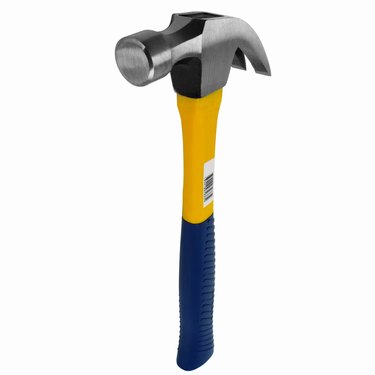
Putting in a cedar closet is not too much different from any other type of closet, except, of course, for your inside wall covering -- which will consist of cedar boards instead of wallboard or paneling. Cedar (make sure it is freshly-cut Eastern red cedar) is often used to line a closet because it is highly aromatic and keeps the space free of unwanted insects. Follow a few strategies that will simplify putting in a basement closet.
Framing
Video of the Day
Standard 2-by-4 framing is used for putting in a closet. Don't cut corners (literally) and make sure every part of the closet is fully framed, including the ever-important interior corners. Because thin cedar boards will be covering the wall, be sure that the vertical framing members are placed 16 inches on center. If there are no existing stud walls in the basement, you may have to nail the bottom wall plates to the concrete floor with concrete nails. The same can be done to concrete walls. Overhead floor joists should provide a good wooden nailing surface for the wood stud walls.
Video of the Day
Wiring
An overhead light is always a good idea for any closet, so run the wires (or have an electrician do the work) while just the frame is standing. If you do run the wires, have an electrician tie the wires into an existing circuit. It is always best to check things out with your electrician beforehand.
Outside Walls
Cedar is too expensive and time-consuming to place on the outside wall, so put up sheetrock or wall paneling for an inexpensive yet attractive wall covering. Make sure the outside is tight with no gaps. Finish and paint the sheetrock if you go that route.
Inside Walls
This is where the cedar wood goes. Use fresh-cut planks from the Eastern red cedar (the Western red cedar will not repel the insects) Eastern red cedar is purchased in thin boards anywhere from 1/4 to 1/2 inch thick. Install the baseboard before you install the cedar boards. Also, you might want to put a piece of sheetrock on the ceiling and paint it white. This will reflect light, but all the walls of closet need to have cedar covering them.
Do the back wall first, working from the baseboard up. Fit the cedar as tight as possible so as not to leave any gaps between boards. Use colored nails to match the cedar or long, heavy-gauge brads. All seams between the cedar boards should land on a vertical stud. Nail each side of the seam with at least three nails or brads. Also, each board must be nailed to every wall stud to secure a good, solid fit. Cedar can be cut with a handsaw or power miter box.
Door and Trim
If you are putting up a pre-hung hollow core door, install the door after the cedar siding is installed, but if you are making your own jamb and hanging your own door, you may want to install the jamb and the hang the door before you put up the siding. In this case, leave the door trim off the inside and just butt the cedar siding right up against the jamb. Baseboard molding is always needed on both the inside and outside of the closet. Door trim is always placed on the outside of the closet. Consider putting a piece of carpet on the floor to finish the closet.